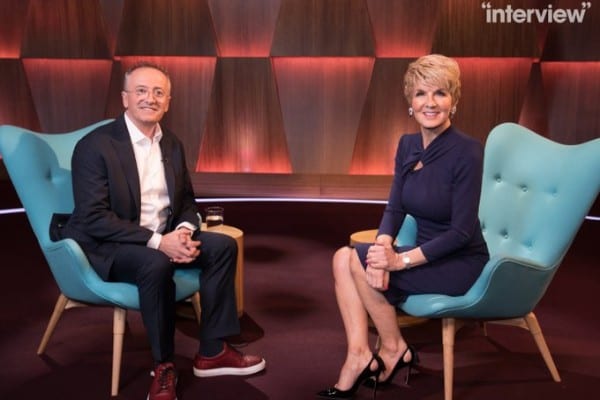Bishop discussed the phenomena she observed, after a long time being the only woman in the room, of having her ideas dismissed by male colleagues only to be embraced by the group when proposed by a man.
TOMORROW: "I love men and I think they have a wonderful contribution to make to humanity. But if you’re the only female voice in a room, they just don’t seem to hear you." – @HonJulieBishop on often being the only female in a room of men. #InterviewAU 8.30pm Tues on @Channel7. pic.twitter.com/PsbgmvfGjH
— Andrew Denton's "Interview" (@InterviewAU) August 12, 2019
Initially, Bishop explained, she thought it was something wrong with her. When she raised it at an overseas meeting of various female leaders she discovered it wasn’t just her.
She described one of the more vile gender-related attacks that the former Prime Minister Julia Gillard faced as ‘grotesque’ and ‘pathetic’.
To change the ‘culture’ in which this sort of conduct was accepted she said numbers matter and getting more women into parliament is key.
“There must be a critical mass of women and 50 per cent sounds like a good idea. I would think that the more women that are in politics, the more they would say that behaviour was unacceptable,” she said.
Since Bishop’s departure from federal politics she has spoken about women and gender often, which itself is a marked departure from the stance she adopted throughout her career.
Her opposition to the ‘feminist’ label is famous. Indeed on Tuesday evening Bishop did tell Denton that, generally speaking, she had preferred not to approach the world through the ‘prism of gender’.
If only that was viable.
As I watched Channel 7 on Tuesday night I felt conflicted. Notwithstanding her newfound interest in openly discussing the shortcomings of male-dominated parliament or the sexism Gillard faced, I can’t overlook her distinct lack of interest in acknowledging these issues when she was in parliament and in power.
She was one of Australia’s most effective and successful female politicians. The fact she wasn’t even considered a contender for leader was, in itself, a grand showing of the double standards men and women face in Canberra .
She had a profile – and popularity – that few others in the government enjoyed. There is no doubt that she was a supremely competent and hard-working MP.
On one occasion several years ago now, that I had an opportunity to watch Julie Bishop speak off the cuff for over an hour to a group of corporate lawyers in Sydney at close proximity, her intellect and capacity were incredible to observe.
At the time she was deputy leader to Tony Abbott and had just returned from a trip to Russia in the aftermath of MH370. Watching her deftly field tricky questions on everything from terms of trade, to economic security, to diplomacy she was a total class act – informed, intelligent, warm and funny.
The only question, to my mind, on which she faulted was the one I posed and it related to her comment about not viewing the world the prism of gender. I asked, if the only female in Cabinet isn’t willing to adopt the ‘female’ lens from time to time who might we expect to do it?
Back in 2014 I wrote that I was reluctant to saddle Bishop with the responsibility for representing the entire female population. My reasoning was that no one expected Joe Hockey or Tony Abbott or Malcolm Turnbull to adequately represent the interests of all men.
I also acknowledged then, and more recently, the constraints she faced in being a very senior female in a Liberal government and party, vehemently opposed to acknowledging the systemic and structural disadvantages women faced.
Her speaking out in favour of quotas or reform or the need for women at the Cabinet table or sexism wouldn’t have been welcome.
And yet the fact remains that other women – for example Kelly O’Dwyer – did speak out about the need for quotas even back in 2013.
Several of her senior male colleagues spoke publicly on issues in ways that weren’t exactly welcome – Peter Dutton and Barnaby Joyce are two that spring to mind. Both of these men were unafraid to speak their minds – even when it made them unpopular.
My understanding is that as foreign minister Julie Bishop certainly attempted to pursue a feminist approach to the foreign aid budget – albeit not with that label.
But watching Julie Bishop regale Andrew Denton last night I couldn’t help but consider the lost opportunity. For Bishop to have been a little more vocal and engaged on the issue of gender when she was in Canberra, in a position to effect change.


